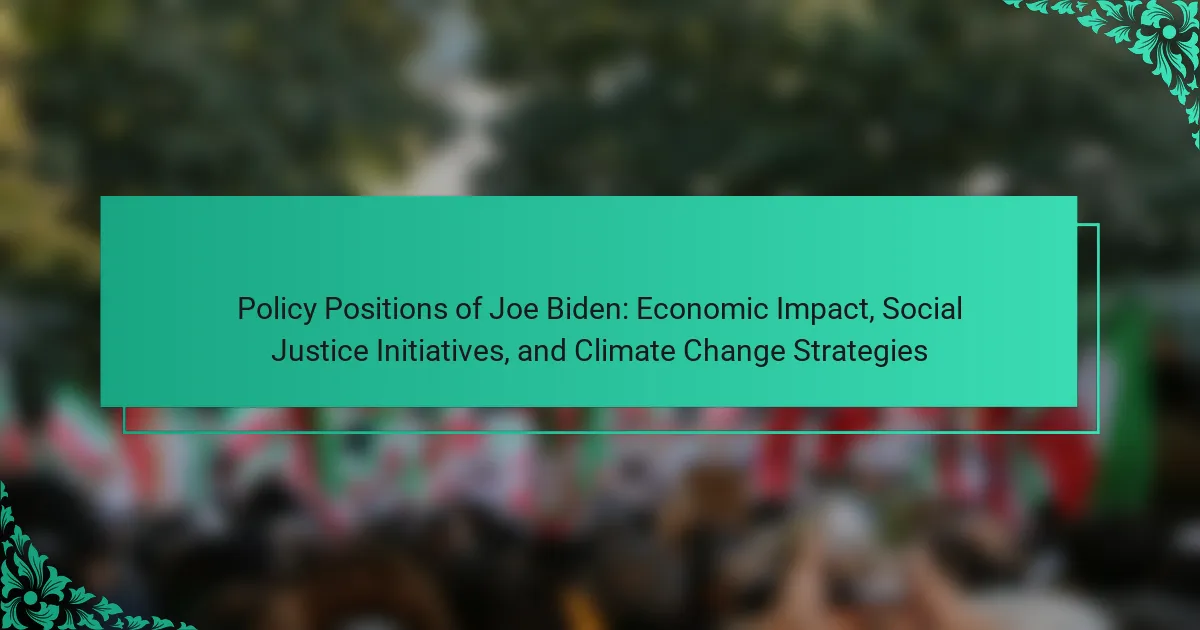Joe Biden’s policy positions focus on three primary areas: climate change, economic recovery, and social justice. His administration aims for net-zero emissions by 2050 through significant investments in clean energy, while also prioritizing job creation in renewable energy sectors. Biden supports raising the federal minimum wage to $15 per hour, enhancing worker rights, and advocates for expanded healthcare access and reduced prescription drug costs. Additionally, his policies emphasize racial equity, criminal justice reform, immigration reform, and support for the Deferred Action for Childhood Arrivals (DACA) program. This overview highlights the key initiatives and strategies that define Biden’s approach to governance.

What are the key policy positions of Joe Biden?
Joe Biden’s key policy positions include addressing climate change, promoting economic recovery, and advancing social justice. He aims to achieve net-zero emissions by 2050 through investments in clean energy. Biden’s economic plan focuses on job creation, particularly in renewable energy sectors. He supports raising the federal minimum wage to $15 per hour to enhance worker rights. Biden advocates for expanding access to healthcare and reducing prescription drug costs. His administration emphasizes racial equity and criminal justice reform. Biden’s policies also address immigration reform and support for the Deferred Action for Childhood Arrivals (DACA) program.
How do Biden’s policies impact the economy?
Biden’s policies impact the economy through increased federal spending and investment in infrastructure. His administration’s focus on job creation aims to reduce unemployment rates. The American Rescue Plan allocated $1.9 trillion to support recovery from the COVID-19 pandemic. This funding provided direct payments to individuals and financial support for businesses. Additionally, Biden’s emphasis on renewable energy is expected to create new jobs in that sector. His policies also aim to address income inequality through tax reforms. The proposed tax increases on corporations and wealthy individuals are designed to fund social programs. These changes can affect overall economic growth and consumer spending patterns.
What specific economic initiatives has Biden proposed?
Biden has proposed several specific economic initiatives. These include the American Rescue Plan, aimed at providing COVID-19 relief. This plan allocated $1.9 trillion for direct payments, unemployment benefits, and vaccine distribution. Another initiative is the Infrastructure Investment and Jobs Act, which invests $1.2 trillion in transportation, broadband, and utilities. Biden also introduced the Build Back Better plan, focusing on social programs and climate change investments. This plan seeks to reduce child poverty and expand healthcare access. Additionally, he has emphasized raising the minimum wage to $15 per hour. These initiatives reflect his commitment to economic recovery and social equity.
How do these initiatives aim to stimulate job growth?
These initiatives aim to stimulate job growth by investing in infrastructure, clean energy, and technology sectors. They prioritize job creation through government-funded projects and incentives for private sector investment. For example, the Bipartisan Infrastructure Law allocates $1.2 trillion for roads, bridges, and broadband expansion. This investment is projected to create millions of jobs across various industries. Additionally, the focus on renewable energy aims to transition the workforce towards sustainable jobs. Research from the International Renewable Energy Agency indicates that transitioning to clean energy could generate 24 million jobs globally by 2030. These strategic investments are designed to ensure long-term economic growth and resilience.
What role does social justice play in Biden’s policy framework?
Social justice is a central component of Biden’s policy framework. It aims to address systemic inequalities in various sectors. Biden’s administration emphasizes equity in healthcare, education, and employment. Initiatives include expanding access to affordable healthcare and supporting minority-owned businesses. The American Rescue Plan allocated funds to assist disadvantaged communities. Additionally, Biden’s policies focus on criminal justice reform and immigration reform. The administration seeks to ensure fair treatment for all individuals. These efforts reflect a commitment to creating a more equitable society.
What initiatives has Biden introduced to promote social equity?
Biden has introduced several initiatives to promote social equity. The American Rescue Plan Act includes provisions to support marginalized communities. It allocates funds for education, healthcare, and housing. Biden’s Executive Order on Advancing Racial Equity aims to address systemic racism. This order mandates federal agencies to assess their policies for equity impacts. The administration also focuses on increasing access to capital for minority-owned businesses. Programs like the Community Development Financial Institutions Fund provide financial support. Additionally, Biden’s infrastructure plan emphasizes equitable job creation. These initiatives reflect a commitment to fostering social equity across various sectors.
How do these initiatives address systemic inequalities?
These initiatives address systemic inequalities by promoting equitable access to resources and opportunities. They aim to reduce poverty and improve economic mobility among marginalized communities. For example, the Biden administration has proposed increased funding for education and job training programs. This funding targets low-income areas to enhance skills and employability. Additionally, initiatives focus on healthcare access, aiming to eliminate disparities in health outcomes. The American Rescue Plan includes provisions for direct financial assistance to disadvantaged families. These measures collectively work to dismantle barriers that perpetuate inequality.
What strategies does Biden have for combating climate change?
Biden’s strategies for combating climate change include rejoining the Paris Agreement and implementing the Clean Power Plan. He aims to achieve net-zero greenhouse gas emissions by 2050. The administration promotes investments in renewable energy sources like wind and solar. Biden’s plan also emphasizes electric vehicle adoption and infrastructure development. The American Jobs Plan allocates funds for sustainable transportation and energy efficiency. The goal is to create millions of clean energy jobs. Additionally, Biden supports conservation efforts and climate resilience initiatives. These strategies are designed to address climate change while fostering economic growth.
What are the main components of Biden’s climate action plan?
Biden’s climate action plan includes several main components. The plan aims to achieve net-zero greenhouse gas emissions by 2050. It emphasizes a transition to clean energy sources such as wind and solar. The plan also proposes investments in infrastructure to support climate resilience. Additionally, it includes initiatives for creating green jobs in renewable energy sectors. The plan focuses on environmental justice to ensure equitable benefits for all communities. Furthermore, it seeks to restore and protect natural ecosystems. Lastly, the plan outlines commitments to international climate agreements, reaffirming U.S. leadership in global climate efforts.
How does Biden’s approach compare to previous administrations?
Biden’s approach differs significantly from previous administrations in several key areas. His economic policies emphasize stimulus and recovery, notably through the American Rescue Plan, which allocated $1.9 trillion to combat the pandemic’s effects. This contrasts with past administrations that focused more on tax cuts and deregulation.
In terms of social justice, Biden has prioritized racial equity and police reform, marking a shift from prior administrations that did not address these issues as directly. His administration has taken steps to reverse policies seen as discriminatory, such as reinstating protections for [censured] individuals.
On climate change, Biden rejoined the Paris Agreement and proposed ambitious goals for reducing carbon emissions. This is a marked departure from the previous administration, which withdrew from the agreement and rolled back numerous environmental regulations.
Overall, Biden’s policies reflect a more progressive stance on economic recovery, social equity, and environmental sustainability compared to his predecessors.
How do Biden’s economic policies intersect with social justice initiatives?
Biden’s economic policies aim to promote social justice by addressing income inequality and systemic discrimination. His administration focuses on increasing the minimum wage and expanding access to affordable healthcare. These measures are designed to uplift marginalized communities. Additionally, Biden’s infrastructure plans prioritize investments in underserved areas. This approach seeks to create equitable job opportunities. The American Rescue Plan includes provisions for direct financial assistance to low-income families. This financial support helps reduce poverty rates among vulnerable populations. Overall, Biden’s policies intertwine economic growth with social equity goals.
What are the anticipated outcomes of Biden’s climate change strategies?
Biden’s climate change strategies aim to significantly reduce greenhouse gas emissions. The goal is to achieve a 50-52% reduction from 2005 levels by 2030. This would align with the United States’ commitments under the Paris Agreement. Investments in renewable energy are expected to create millions of jobs. Transitioning to clean energy sources like solar and wind will also enhance energy independence. Additionally, Biden’s policies promote environmental justice. This ensures that disadvantaged communities receive support and protection from climate impacts. Overall, these strategies are designed to foster a sustainable economy while addressing climate change.
What challenges does Biden face in implementing his policy positions?
Biden faces significant challenges in implementing his policy positions. These challenges include partisan division in Congress. The Democratic Party holds a slim majority, limiting legislative support. Additionally, bipartisan opposition complicates efforts to pass key initiatives. Public opinion also fluctuates, influencing policy feasibility. Economic conditions, such as inflation, can hinder implementation. Furthermore, interest groups may resist certain policies, creating barriers. These factors collectively impact Biden’s ability to fulfill his agenda.
How can public support influence the success of these policies?
Public support can significantly influence the success of policies. High public approval can lead to increased political pressure on lawmakers to implement and sustain policies. For example, when citizens advocate for climate change initiatives, politicians are more likely to prioritize these issues. Research shows that policies with strong public backing often receive more funding and resources. Additionally, public support can enhance community engagement, fostering collaboration between government and citizens. This collaboration can improve the effectiveness of social justice initiatives. Ultimately, widespread support creates a favorable environment for policy success.
What role do bipartisan efforts play in advancing Biden’s agenda?
Bipartisan efforts are crucial in advancing Biden’s agenda. They facilitate collaboration between Democrats and Republicans. This cooperation is essential for passing legislation in a divided Congress. For example, Biden’s infrastructure plan received bipartisan support, leading to its successful enactment. Additionally, bipartisan efforts can enhance the legitimacy of policies. They often result in broader public acceptance and implementation. Historical precedents show that bipartisan initiatives tend to yield more sustainable outcomes. Overall, bipartisan collaboration is a strategic approach for Biden to achieve his policy goals.
The main entity of the article is Joe Biden’s policy positions, which encompass economic impact, social justice initiatives, and climate change strategies. The article outlines Biden’s key policies, including efforts to address climate change through net-zero emissions by 2050, promote economic recovery via job creation and infrastructure investment, and advance social justice through equity-focused initiatives. It discusses the anticipated outcomes of these policies, challenges faced in implementation, and the importance of public support and bipartisan efforts in achieving Biden’s agenda. Overall, the article provides a comprehensive overview of Biden’s multifaceted approach to governance.
